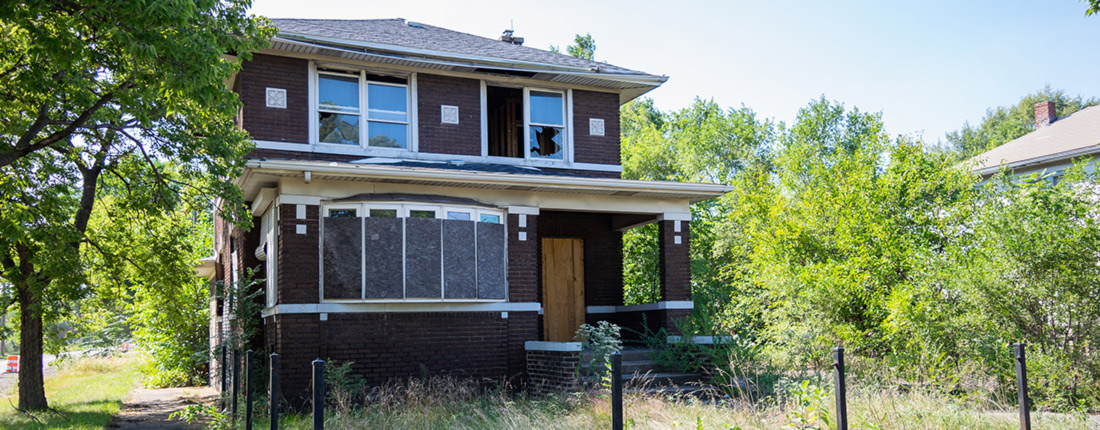SCOTUS Tyler v. Hennepin County Ruling Poses Opportunities, Unintended Consequences for Communities Fighting Vacant and Abandoned Properties
May 26, 2023

Supreme Court ruling may make it harder for public entities to move abandoned, tax-delinquent properties to responsible owners, but presents an opportunity to equitably reform property tax systems.
WASHINGTON, DC – The Center for Community Progress (Community Progress) expresses concern about the unintended consequences of the 9-0 Supreme Court ruling in Tyler v. Hennepin County that Minnesota violated the Fifth Amendment’s takings clause when it retained the surplus from the sale of a tax-delinquent property. Community Progress agrees property tax systems in every state need equitable reform. However, the Court’s ruling has the potential to undermine practices communities have been using to address widespread vacancy and decades of disinvestment.
“Across the country, there are rural, urban, and suburban communities facing daunting levels of vacant and abandoned properties which significantly harm residents’ safety, quality of life, and ability to build wealth. The delinquent property tax enforcement process is one of the most powerful tools a government has to put these properties on a path towards responsible ownership and reuse,” said Danielle Lewinski, Vice President of Technical Assistance at the Center for Community Progress. “The Court’s ruling in Tyler v. Hennepin County risks undermining public entities’ ability to intervene in and interrupt the cycle of property abandonment and speculative ownership that hurts neighbors and neighborhoods.”
The ruling could impact systems that several states—like New York, Ohio, and Michigan—have crafted over the past decade to combat widespread property abandonment. In these states and others, public entities including land banks and local governments acquire abandoned, tax-delinquent properties before they go to public auction and steward these properties to new, responsible owners. This keeps them out of the hands of out-of-state speculators and unscrupulous owners who often continue to neglect the property and avoid taxes. The Court’s ruling may make it difficult or extremely costly for states that have been using this critical process to move abandoned properties to responsible reuse in distressed markets. The ruling could also incentivize irresponsible investor-owners to walk away from their debts to a city if there is promise of a surplus payout.
Property taxes fund basic community services like schools, roads, parks, sidewalks, and public safety—the things that enable families to live and build wealth in vibrant, secure neighborhoods. When an owner walks away from a property and stops paying taxes, the vacant property drains local tax dollars through repeated police, fire, and code calls; invites criminal activity and illegal dumping; and harms the equity of nearby property owners.
Unfortunately, most tax systems are designed in a way that causes incredible harm to neighborhoods, especially Black and Brown neighborhoods experiencing concentrated poverty. Indeed, the neighborhoods most impacted by tax delinquency and vacant—what some call “blighted”—properties tend to be those home to majority Black and Brown residents. These communities desperately need tools that can help repair decades of racist policies and disinvestment.
Community Progress is a staunch advocate of a more fair and equitable property tax system—from assessments to the disposition of foreclosed properties—and helps communities reform and use delinquent property tax enforcement processes to equitably address systemic vacancy. We urge states to seize this moment to identify ways to improve their whole property tax system, not only the portion impacted by the ruling.
By taking steps like reevaluating property assessments and offering tax breaks, exemptions, and payment plans to keep owners from becoming delinquent, cities can make it far more likely that the only properties that slide into tax delinquency and foreclosure are those abandoned or owned by irresponsible, speculative parties. In those instances, it is critical to swiftly foreclose and transfer that property to new, responsible ownership that meets community priorities.
“The best place to protect home equity is to focus on upstream measures that keep people out of tax delinquency in the first place,” said Lewinski. “We urge states that will need to reform property tax foreclosure in response to this ruling to protect both an owner’s ability to access surplus proceeds from a tax auction and a community’s ability to address abandoned properties. We believe it can be done, and we welcome the chance to work with policymakers to make this system better for all.”
Recent Press Releases
Subscribe to join 14,000 community development leaders getting the latest resources from top experts on vacant property revitalization.
